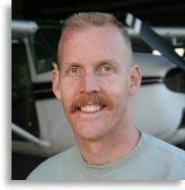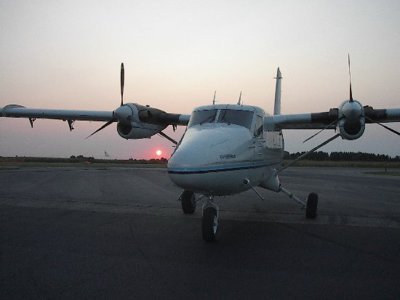Recommended Posts
skydived19006“You’re obviously educated beyond your intelligence.”
Martin
Epic ending to an epic forum debate... Well done all who participated.
Joe D.
I am only hear to learn how to please the Divers with my pilot'n abilities and whatnot...
I am only hear to learn how to please the Divers with my pilot'n abilities and whatnot...
riggerrob 644
Thanks for reviving this thread. Interesting how it preceded 2008 August 3. Lawyers don't want me talk about what happened on Sunday, 2008 August 3. They are afraid that I will biased the next court hearing.
riggerrob 644
USPA might start by publishing "best business practices" for jump pilots, and publish them in a format that a C-licensed jumper can understand. If the accident rate drops, cool!
If the accident rate does not drop, then USPA threatens to require jump-pilots (at USPA-affiliated Group Member DZs) to write a simple exam. If the accident rate drops, cool!
If not, USPA publishes standards for formal check rides. If the accident rate drops, cool!
If not, USPA starts sending check pilots around to group member DZs.
Etc.
The strategy is to slowly ramp-up pressure on "slacker DZOs."
If the accident rate does not drop, then USPA threatens to require jump-pilots (at USPA-affiliated Group Member DZs) to write a simple exam. If the accident rate drops, cool!
If not, USPA publishes standards for formal check rides. If the accident rate drops, cool!
If not, USPA starts sending check pilots around to group member DZs.
Etc.
The strategy is to slowly ramp-up pressure on "slacker DZOs."
As a newb to this realm of wonder and trying to learn the correct habits of of a Proper Jump Pilot, my curiosity is now peaked as to this date you speak off. Is there a combination of words of which I could google and teach myself so that you can maintain your lawyerly mandated gag order?
Joe D.
I am only hear to learn how to please the Divers with my pilot'n abilities and whatnot...
I am only hear to learn how to please the Divers with my pilot'n abilities and whatnot...
riggerrob 644
Hint, google: 2008 August 3, King Air, Transport Safety Board, Pitt Meadows, British Columbia.
Very Interesting occurrence. I can understand why you would have to keep certain opinions off the social airwaves. Thank you for the lesson. Lots of things to think about with this particular event.
Joe D.
I am only hear to learn how to please the Divers with my pilot'n abilities and whatnot...
I am only hear to learn how to please the Divers with my pilot'n abilities and whatnot...
Makes for interesting reading with words like 250hr wonder, hot refuel ops, CG etc!
Let's start with your 250hr wonder pilot or cheap low hr pilot as to which he/she is so casually derogatory referred to, that pilot may have just spent a 4 year graduate degree at Embry-Riddle Aeronautical University, where he spent more time studying aerodynamics etc and all facets of flying, than most of you voicing your opinion here put together, he has minimum a Commercial Airman Certificate and is a professional pilot even with his low hours and he maybe does not have rich parents who can pay for a turbine or jet rating so he has to work for low pay trying to further his career to get to that coveted airline job! He does a medical every 6 months, proficiency checks every 6 months, Instrument renewal every year, Dangerous goods/ CRM /TCAS / MCC / RVSM / Language Prof check / fire fighting courses as well as complying with a host FAA regulations as required. He has passed all the flight test as required. When he did for example his 182 training he had to do a written and oral test as well as a flight test in which all he has to demonstrate all phases of flight including max perf take offs in hot and high condition at Max all up weight, slow flight etc and deal with host of emergencies. A 250 hr pilot might even be a bit more conservative that a 3000hr pilot. He has also invested a load of $ to get where he is, following a career path, other than skydivers doing it for fun. If the DZO is skimping on maintenance then the pilot can do nothing about it. Your experienced jump pilot also started out new as a jump pilot even if he had a lot of hrs, just like the sky gods who have a lot to say about new pilots and new skydivers, forgetting their humble beginnings!! Let's move on to bigger machines like Caravans, King Airs and DHC6's, there are very few pilots flying those machines with low hours, first of all the Insurance requires X amount of time on type before just letting anyone loose on a 1million $+ machine! Each of those machines require a mostly self funded separate type rating and involves ground schooling and costly sim sessions and a check ride on type and even then the insurance wants time on type, so that pilot has to fly as a co pilot on the machine until such time the insurance requirements are met. In turbines and jets the insurance dictates wether you can or cannot fly as a PIC. So maybe bear the previous in mind when you so casually refer to the 250hr wonder!
As to the remark about hot fuelling procedures, you should not even be concerned with it as no skydiver should be near the pumps in any case or even in the vicinity when it is done. Once again the pilot of the acft know what is required as stated in the POH and the procedures etc at the refuelling point.
Introducing a jump pilot course and rating certificate where a pilot will have to hire the said acft to do training and have the local FSDO testing officer do the practical flight test will mean extra cost to a pilot who has already spent countless $ to just be able to fly! What if they have to do a certificate for each different acft he flies at the DZ and he has to pay for it as the DZO will definitely not? The result that the low pay flying skydivers around and living on a DZ like a destitute dog is not worth the cost and suddenly there is a shortage of 250 hr wonders to get you up there!
Let's start with your 250hr wonder pilot or cheap low hr pilot as to which he/she is so casually derogatory referred to, that pilot may have just spent a 4 year graduate degree at Embry-Riddle Aeronautical University, where he spent more time studying aerodynamics etc and all facets of flying, than most of you voicing your opinion here put together, he has minimum a Commercial Airman Certificate and is a professional pilot even with his low hours and he maybe does not have rich parents who can pay for a turbine or jet rating so he has to work for low pay trying to further his career to get to that coveted airline job! He does a medical every 6 months, proficiency checks every 6 months, Instrument renewal every year, Dangerous goods/ CRM /TCAS / MCC / RVSM / Language Prof check / fire fighting courses as well as complying with a host FAA regulations as required. He has passed all the flight test as required. When he did for example his 182 training he had to do a written and oral test as well as a flight test in which all he has to demonstrate all phases of flight including max perf take offs in hot and high condition at Max all up weight, slow flight etc and deal with host of emergencies. A 250 hr pilot might even be a bit more conservative that a 3000hr pilot. He has also invested a load of $ to get where he is, following a career path, other than skydivers doing it for fun. If the DZO is skimping on maintenance then the pilot can do nothing about it. Your experienced jump pilot also started out new as a jump pilot even if he had a lot of hrs, just like the sky gods who have a lot to say about new pilots and new skydivers, forgetting their humble beginnings!! Let's move on to bigger machines like Caravans, King Airs and DHC6's, there are very few pilots flying those machines with low hours, first of all the Insurance requires X amount of time on type before just letting anyone loose on a 1million $+ machine! Each of those machines require a mostly self funded separate type rating and involves ground schooling and costly sim sessions and a check ride on type and even then the insurance wants time on type, so that pilot has to fly as a co pilot on the machine until such time the insurance requirements are met. In turbines and jets the insurance dictates wether you can or cannot fly as a PIC. So maybe bear the previous in mind when you so casually refer to the 250hr wonder!
As to the remark about hot fuelling procedures, you should not even be concerned with it as no skydiver should be near the pumps in any case or even in the vicinity when it is done. Once again the pilot of the acft know what is required as stated in the POH and the procedures etc at the refuelling point.
Introducing a jump pilot course and rating certificate where a pilot will have to hire the said acft to do training and have the local FSDO testing officer do the practical flight test will mean extra cost to a pilot who has already spent countless $ to just be able to fly! What if they have to do a certificate for each different acft he flies at the DZ and he has to pay for it as the DZO will definitely not? The result that the low pay flying skydivers around and living on a DZ like a destitute dog is not worth the cost and suddenly there is a shortage of 250 hr wonders to get you up there!
Outstanding points. I too was getting worked up earlier as it seemed that some of the posters were blaming the pilot for maintenance issues that were clearly out of his control.
As far as cost go, here is one local flight schools cost breakdown for their Part 61 program. This does not include the tuition cost for a 4 year graduate degree, such as Embry-Riddle Aeronautical University. (That there is some Ivy League book learn'ns) Do the everyday divers spend this much???
PRIVATE PILOT
40 hours minimum $6,400.00
Ground school as needed @ $42.00/hr
Written Test $165.00
Flight Test $500.00
Books & supplies $500.00
Total $7,565.00
INSTRUMENT RATING
40 hours minimum $6,600.00
Ground school as needed @ $42.00/hr
Written Test $165.00
Flight Test $500.00
Books & supplies $150.00
Total $7,415.00
COMMERCIAL PILOT
170 hours minimum $28,050.00
Ground school as needed @ $42.00/hr
Written Test $165.00
Flight Test $500.00
Books & supplies $150.00
Total $28,865.00
* The above flight hours from the Private, Instrument, and Commercial meet the requirements of 250 hours (under Part 61) for a Commercial Certificate.
Total Cost for Private, Instrument, and Commercial is estimated to be a minimum of $43,845.00 depending on which aircrafts are used.
As far as cost go, here is one local flight schools cost breakdown for their Part 61 program. This does not include the tuition cost for a 4 year graduate degree, such as Embry-Riddle Aeronautical University. (That there is some Ivy League book learn'ns) Do the everyday divers spend this much???
PRIVATE PILOT
40 hours minimum $6,400.00
Ground school as needed @ $42.00/hr
Written Test $165.00
Flight Test $500.00
Books & supplies $500.00
Total $7,565.00
INSTRUMENT RATING
40 hours minimum $6,600.00
Ground school as needed @ $42.00/hr
Written Test $165.00
Flight Test $500.00
Books & supplies $150.00
Total $7,415.00
COMMERCIAL PILOT
170 hours minimum $28,050.00
Ground school as needed @ $42.00/hr
Written Test $165.00
Flight Test $500.00
Books & supplies $150.00
Total $28,865.00
* The above flight hours from the Private, Instrument, and Commercial meet the requirements of 250 hours (under Part 61) for a Commercial Certificate.
Total Cost for Private, Instrument, and Commercial is estimated to be a minimum of $43,845.00 depending on which aircrafts are used.
Joe D.
I am only hear to learn how to please the Divers with my pilot'n abilities and whatnot...
I am only hear to learn how to please the Divers with my pilot'n abilities and whatnot...
If only there was a website specifically dedicated to educating jump pilots in a multitude of different aircraft. With a training syllabus, written test, regulations and a graduate level study in all jump plane accidents of the past 33 years.
Hmmmmm.
DiverDriver.com [<-----Click Here]
The accident rate for jump planes since I started the website HAS declined overall. When I started speaking out in 1998 we saw accidents per year in the USA near 20. Now, we are bobbing between 4 and 12 which is way better.
The USPA has incorporated 3 different documents of mine into their material in an effort to address jump plane accidents. The NTSB has recognized these efforts as exceeding their recommendations for improvement. We can continue to improve. But we must recognize that we, as an industry, HAVE improved over the last 15 years.
KNOWLEDGE is the key. A checkride for a new jump pilot rating would be an effort in ensuring that that knowledge has been passed on. However, a checkride and new rating is not required. People can just do it on their own. My website is free to use. I, and many others, are available for consultation. FREE. There is no reason at this time to create a bureaucracy.
And you should know that the government agency for the Czech Republic uses my website as the standard for certifying their new jump pilots. So, the point is just take my website and use it. Make the effort to develop the training course for your DZ using my framework. Participate in the dialogue on my website, the Facebook group DiverDriver.com and here. You will learn. And you can avoid the accidents of the past. If you take it seriously.
I just ask that you buy a shirt, or hat, or jacket to support the website and show the world.
Hmmmmm.
DiverDriver.com [<-----Click Here]
The accident rate for jump planes since I started the website HAS declined overall. When I started speaking out in 1998 we saw accidents per year in the USA near 20. Now, we are bobbing between 4 and 12 which is way better.
The USPA has incorporated 3 different documents of mine into their material in an effort to address jump plane accidents. The NTSB has recognized these efforts as exceeding their recommendations for improvement. We can continue to improve. But we must recognize that we, as an industry, HAVE improved over the last 15 years.
KNOWLEDGE is the key. A checkride for a new jump pilot rating would be an effort in ensuring that that knowledge has been passed on. However, a checkride and new rating is not required. People can just do it on their own. My website is free to use. I, and many others, are available for consultation. FREE. There is no reason at this time to create a bureaucracy.
And you should know that the government agency for the Czech Republic uses my website as the standard for certifying their new jump pilots. So, the point is just take my website and use it. Make the effort to develop the training course for your DZ using my framework. Participate in the dialogue on my website, the Facebook group DiverDriver.com and here. You will learn. And you can avoid the accidents of the past. If you take it seriously.
I just ask that you buy a shirt, or hat, or jacket to support the website and show the world.
Chris Schindler
www.diverdriver.com
ATP/D-19012
FB #4125
www.diverdriver.com
ATP/D-19012
FB #4125





I saw an interesting comment from Mike Mullins regarding the availability of jump pilots. In a drop zone owners forum, someone was lamenting the lack of pilots to fly his turbine aircraft, don’t remember the type. Mike responded “There is no shortage of pilots, just a shortage of pay.”
That pretty much sums it up.
Also on the topic of pilots and pay, I had a “200 Jump Wonder” skydiver mention to me that she thought I should pay my pilots more. I told her “I’ll pay them $25 a load if that’s what everyone thinks should happen. It will drive the cost of your slots up by $4.” To which she responded “Why do I always got’a pay?” End of conversation.
It’s amazing how stupid some people can be regardless of education! Seems that many get the common sense educated out of them. Or as Jerry Clower would have said “You’re obviously educated beyond your intelligence.”
Martin
AC DZ
Share this post
Link to post
Share on other sites